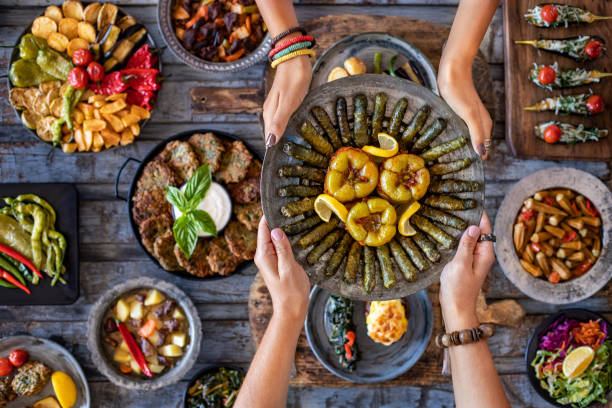
Feeding behaviors form bonds across species: a mother bird feeding her chicks, for example, is a gesture of care and protection, helping to strengthen their bond. Similarly, wolves bringing meat back to their pack is not only about nourishment but also about reinforcing social bonds and hierarchy within the group. In much the same way for humans, food is also a way to both fill the stomachs and connect hearts. And cooking, in its essence, plays an important role in connecting us, not only with each other but with the world around us.
In Lebanon, especially, food is often a communal experience: from the tradition of mezze dishes – which is a perfect example of the everlasting Lebanese will to prolong any moments of enjoyment in life – to the dying tradition of “neswen el-foron” gathering to bake bread for the entire village and ensuring no one goes hungry.
Additionally, food embodies our diverse culture, values, and memories. Indeed, any event in our country is marked by the specific foods we eat to celebrate it: maamoul tastes the best on Easter, kellej on Ramadan, and meghle when visiting a mother and her newborn. Even without any occasion, any Lebanese will never pass an opportunity to boast about the national heritage that is our gastronomy. When we're away from home and feeling homesick, one of the things we miss most is the comfort of its familiar flavors, which evoke a sense of belonging and connect us to the heart of our roots.
More generally, in times of hardship, survival is a triumph, and cooking becomes a form of profound resistance. The heroes in Gaza who risk their lives daily to gather food or cook for others truly deserve great respect. Parallelly, in less life-or-death conditions, keeping traditional dishes alive is pure resilience against any oppression.
On a more individual scale, cooking with someone or for them is a way to directly connect with another. Meals made by loved ones can certainly evoke the most cherished memories, no matter their simplicity. Some of the humblest meals can be the ones that provide the greatest comfort because of the person who made them.
Cooking is a heartwarming symbol of care, whether it’s your friend making you a birthday cake, your grandma waking up at dawn to make you manakeesh, your aunts and uncles going out of their way to make you dinner, your dad making you a sandwich, or your brother sharing the pancakes he made at midnight… Sadly, this nurturing task is often placed on women or mothers, which can make it feel burdensome. Yet, women continue to prepare meals to nourish their families, even if they hate cooking, as a testament of their love and devotion.
All of that is why no Michelin-star chef could ever match the comfort found in a loved one’s homecooked meal. Because cooking is an art, and the best kind of art is the one that touches your heart.